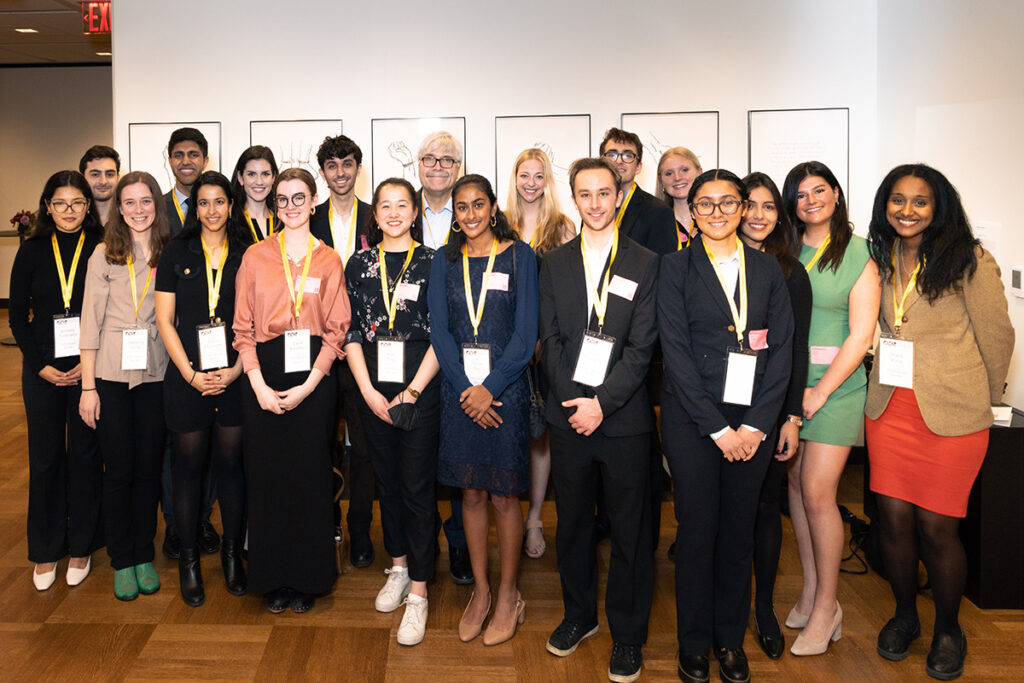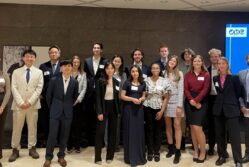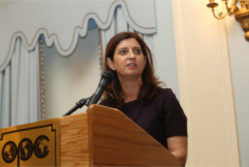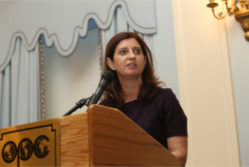Event Coverage Highlight

OPC Foundation Honors 2024 Scholars at Evening Reception

Left to right: Brunella Tipismana, Michael Wakin, Catherine Cartier, Simar Bajaj, Trisha Mukherjee, Hannah-Kathryn Walles, Laura Robertson, Dani Morena Trettin, Kate Selig, John Daniszewski, Sonia A. Rao, Paige Cromley, Mark Banchereau, Sam Harshbarger, Audrey Thibert, Jade Lozada, Coral Murphy Marcos, Noelle Harff, Hana Kiros
by Chad Bouchard
On March 5, OPC Foundation President John Daniszewski opened this year’s scholarship awards celebration, his first time presiding over the event since taking the helm last year.
“I think you’ll agree that we have an impressive group of young people this year, who prepared themselves and aspire to the great and noble vocation of being international correspondents, helping to bring the world closer,” Daniszewski said, addressing the crowd of family, friends and supporters who gathered to honor 18 journalists chosen by judges to be among the best of their generation. “And believe me, in these times, we need that.”
He also took a moment to honor the vital work of his predecessor, William J. Holstein, who served as the foundation’s president for 27 years.
“It is no exaggeration to credit him for making this organization what it is today. His zeal for helping young journalists get started is unmatched,” Daniszewski said.
Holstein is a former China correspondent for United Press International (UPI), and over his career was reporter and editor for BusinessWeek and the U.S. News & World Report, among many others. He is the author of 10 books, most recently Battlefield Cyber: How China and Russia Are Undermining Our Democracy and National Security (Prometheus, August 2023), co-authored with Michael McLaughlin.
The foundation will send 11 winners this year to newsrooms around the world for The Associated Press, Reuters and The Wall Street Journal, among others.
To watch a full recording of the celebration, scroll to the bottom of this recap for an embedded video window, or click here.
More information about this year’s scholars can be found here on the foundation’s website.
The foundation will send 11 winners this year to newsrooms around the world for The Associated Press, Reuters and The Wall Street Journal, among others.
The OPC Foundation expressed gratitude to its sponsors: the Benefactors – Bloomberg, Jeremy Main and Mercedes-Benz; Patrons – Reuters, The Wall Street Journal and the Ward Creek Foundation; and its Friends – The Associated Press, CBS News, the Pamela Howard Family Foundation, NBCUniversal Media Group, Quest Diagnostics and the Taipei Economic and Cultural Office in New York.
Daniszewski announced that for the first time, the foundation is planning to provide reporting grants, primarily for former OPC Foundation winners to continue their freelance reporting projects.
“Also for the first time, we’ll have a fellowship dedicated to covering Eastern and Central Europe, which is such an important part of the world to me,” he said. The fellowship will be named in honor of Rob Urban, an international business journalist who spent 28 years at Bloomberg News.
Urban’s work from Prague helped Bloomberg win the OPC’s 1994 Malcolm Forbes Award for a series on financial fraud tied to the collapse of the Czech Republic’s Banka Bohemia. He died in 2023 at the age of 66. His wife Laura Zelenko and Bloomberg helped to create the fellowship.
Brunella Tipismana, winner of the Seymour and Audrey Topping Scholarship, reported on brutal political violence in her home country of Peru, with support from the North American Council for Latin America, and examined how media shaped the outcome of the crisis.
“In Peru, one family owns 80 percent of the print market, and the top four TC channels own 50 percent of the audience share. This lack of pluralism led to widespread censorship of state brutality outside of Lima,” she said, noting that there is similar oppression in Brazil, Myanmar and Somalia. “I have realized that I need to dedicate my time to strengthening our shared civil and political values, in a world where technology and totalitarian impulses seem to tear them apart.”
Tipismana, a student at Yale University, is bilingual in English and Spanish and speaks some Russian and French. She is an editor at the Yale Daily News.
Trisha Mukherjee, winner of the Stan Swinton Scholarship, talked about her project to document survivors of communal and religious violence in India and the former Bengal during the partition and forced relocation into Muslim and Hindu regions in 1947. She said she sometimes traveled with her grandmother, who had experienced the division firsthand.
“The survivors told us stories of lost family members, shattered dreams, and an endless longing for a home they could never return to,” she said. “As a journalist, I’ve continued telling stories about home and migration.”
Her work includes reporting on the US-Mexico border and a podcast on global activism. A graduate of the Columbia University School of Journalism, she is fluent in Spanish, Bengali and some Hindi.
Hana Kiros, winner of the S&P Global Award for Economic and Business Reporting, discussed an editorial she wrote for The Washington Post, which broke news that Ethiopia was exploiting a cease-fire in Tigray, blockading humanitarian aid as hundreds of thousands of people died from starvation. During the two years the conflict lasted, she worried about the safety of her grandparents and cousins who lived there.
“I feel a deep sense of duty. I know that my life’s work is reporting on places where people are suffering, especially where no one seems to care.”
Kiros has an OPC Foundation fellowship with The Wall Street Journal in London. She is fluent in two Ethiopian languages and is finishing her master’s degree at the University of Oxford.
Sam Harshbarger, the winner of the Roy Rowan Scholarship, said his interest in international journalism started in middle school, when he traveled to central Russia to document Indigenous communities. Later after graduating high school, he traveled to southeastern Turkey to work with a Syrian-American humanitarian organization.
“I was fascinated by Turkey’s complicated history and politics, and returned countless times over my college years, working with the Foreign Policy Research Institute, and the New Alliance Institute,” he said. Harshbarger is a Rhodes Scholar at Oxford University. When he is finished, he plans to move to Istanbul to pursue journalism full time. “I hope to tell the stories of transnational politics that cross the traditional boundaries of the former Soviet Union and the Middle East from Istanbul.”
The winner of the Jerry Flint Fellowship for International Business Reporting, Coral Murphy Marcos, spoke about the devastation of Hurricane Maria in her hometown and University of Puerto Rico in 2017, and her experience as a local reporter covering injustice while supporting her family during the disaster. Murphy Marcos was accepted to a program at Brown University for displaced students from the University of Puerto Rico.
“I learned all about the hardships that people displaced by climate change face, such as adapting to cultural shock and speaking a non-native language,” she said. “I’m determined to continue reporting, from the ground, focusing on environmental business hotspots in Latin America. I want to explain the unseen effects that public policies have on the environment and marginalized communities.”
As a reporting fellow for The New York Times, Murphy Marcos covered Wall Street and has worked as a tech reporter for USA Today and a freelancer for the Guardian. She is a student at the University of Southern California, Berkeley, and speaks Spanish and some French.
Simar Bajaj, who won this year’s Harper’s Magazine Scholarship in memory of I.F. Stone, was inspired to become a science journalist after taking a narrative non-fiction class with author Michael Pollan. He began freelancing in 2022, landing bylines for The Washington Post, TIME, The Atlantic, NPR and the Guardian, covering stories on the intersection of healthcare and technology. For his Guardian story, he said he observed a 12-hour human heart transplant to help him illustrate for readers how pig-to-human transplants might look in the future. Bajaj’s story won Science Story of the Year from the Foreign Press Association and a $40,000 award from the National Academies of Science.
“Over that summer, I also discovered an interest in stigmatized diseases. Such as obesity and lung cancer, where patients are blamed for their conditions,” he said. “I’m determined to report on how these diseases have played out internationally, since the tobacco and processed food industries have global reach.”
After his investigation this summer, Bajaj will attend the University of Oxford this fall as a Marshall Scholar.
Dani Morena Trettin, winner of the Flora Lewis/Jacqueline Albert-Simon Scholarship, recalled an expedition to Panama in the summer of 2022 to report on Indigenous Emberá people, when he discovered that the tour and interaction with residents had been shaped and staged for foreigners, with operators even assigning children to play with the tourists.
“Later, the villagers told me that the government had banned hunting and agriculture on their land – that their only alternative to integrating into cities, to stay in their villages, was to open them to tourism,” he said.
Morena Trettin, who is of mixed European and Indigenous heritage, said colonizing narratives facilitated atrocities against his people. He said Indigenous livelihoods are often romanticized or catastrophized to fit a stereotype.
“I want to tell stories that break this mold. Empowering, not by virtue of embellishing reality, but by narrating truth with sensitivity to context.”
Morena Trettin is fluent in Spanish and Swedish and speaks advanced French, Italian and German, among others. He has an OPC Foundation fellowship with Reuters in São Paulo.
Click the window below to watch the whole awards program.



